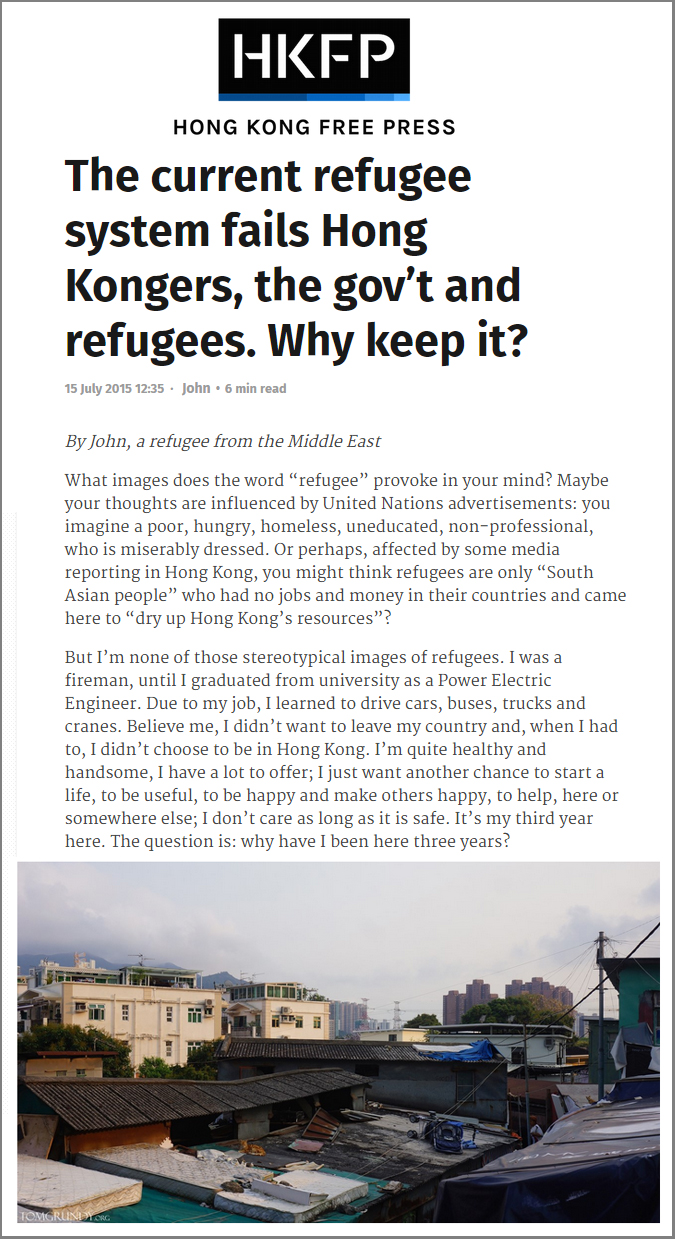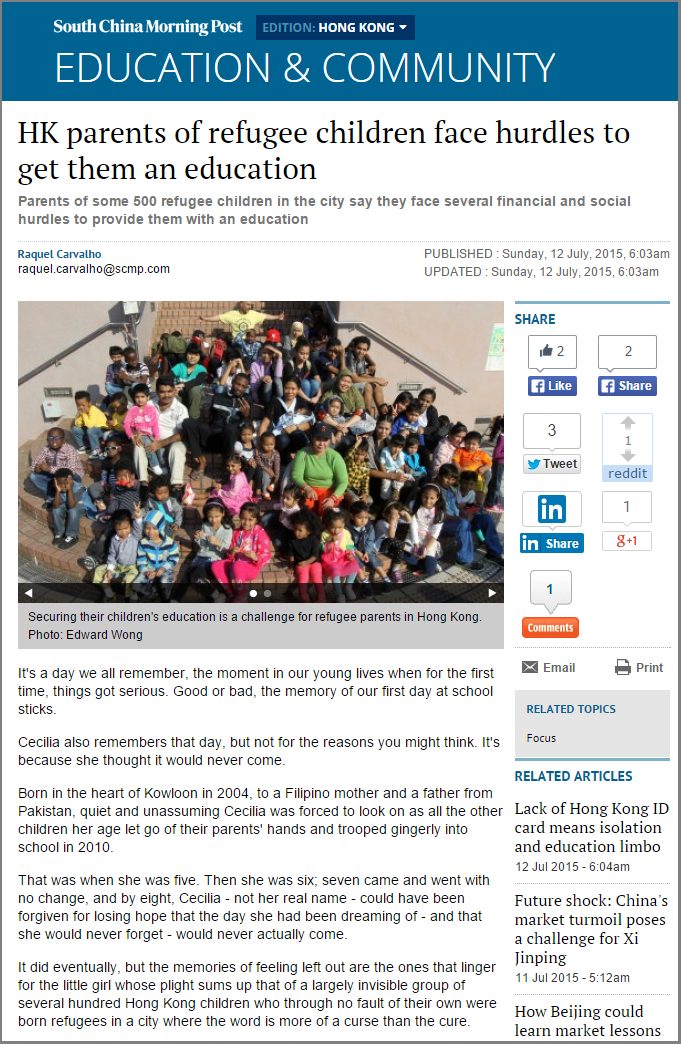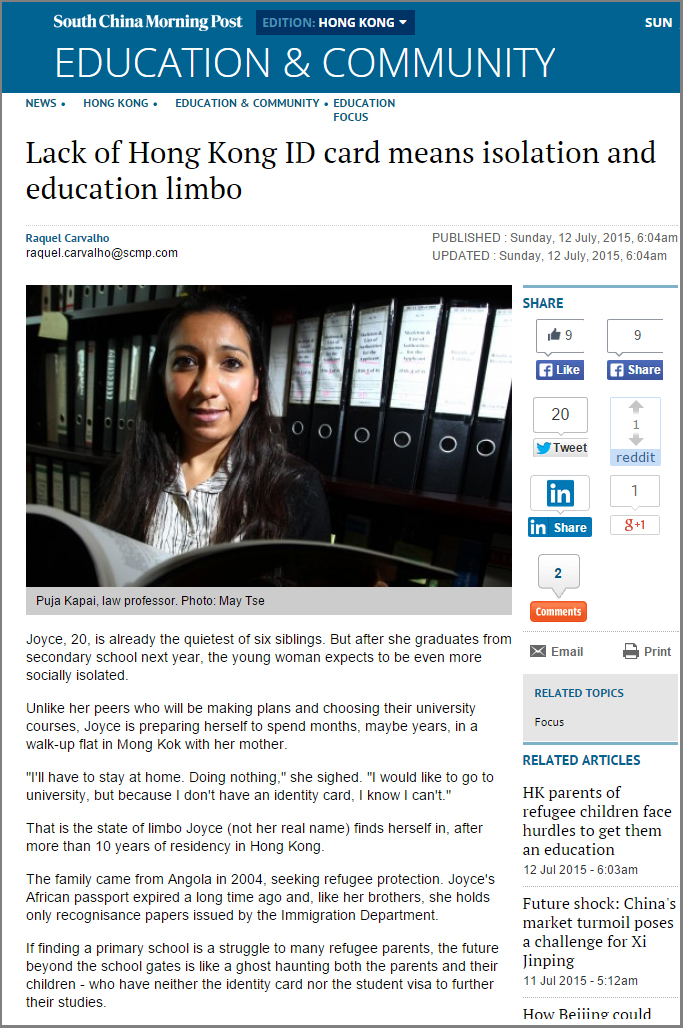All they want to do is reject people
Sep 1st, 2015 | Immigration, Personal Experiences, Rejection, VF Opinion | Comment
“There is no chance for you to make an appeal. You should give up”, an African refugee reported being told by his duty lawyer a few weeks before withdrawing his asylum claim. According to the Standard, on top of 2237 rejected cases, 1600 claimants cancelled their asylum bid since the Unified Screening Mechanism (USM) was launched in March 2014.
Although the number of new arrivals is surging, rejection and withdrawal figures suggest that Hong Kong Government is waging a psychological war that underpins a “long established policy of not granting asylum” (Security Bureau, § 6).
The absurdity of seeking asylum in Hong Kong was a painful experience for Marku (not his real name). Without questioning his credibility, Immigration rejected his claim with the assessment that he could relocate or hide internally in his country.
Concealment in remote areas (including spider holes?) might indeed be an option for individuals fleeing persecution. However, in our experience, Immigration appears to unimaginatively and unconvincingly suggest “internal flight” and “internal relocation” as the only viable alternative when dismissing otherwise credible asylum applications.
“My lawyer said that I should go back to my country and live someplace else,” Marku reported with frustration. “He advised me not to appeal despite hearing that my country was at war and my problem is very big. He said, ‘Your immigration officer was right. He made the right decision to reject your claim.’” Marku was incredulous and had the impression that, “My lawyer just came to help Immigration to reject me!”
Marku continued, “The lawyer didn’t provide even one (COI) document that I saw. Everything I did myself. I didn’t hear him give me any advice, or suggest anything during the interviews. It was like he was not my lawyer. It was like he was one of the officers of Immigration. He did not care about me. He did not care about my case, about anything.”
States erect policy walls inside borders to discourage and deter refugees. These barriers are less sinister, yet arguably more harmful, than border fences. As Marku experienced, such impediments obstruct the course of asylum and the securing of protection, “I have proof. I have everything. I have death certificates (of family members), but they don’t care. I decided to go back because Hong Kong Government is not serious.”
Refugees bounce from interview to interview for years till 99.7% are either rejected or withdraw their claims in frustration. The trend is less indicative of abuse, than a challenge to the credibility of an ill-conceived and poorly implemented asylum system. On the flip side, in light of the “long established policy of not granting asylum”, the screen-to-reject process might be considered a resounding success.
Hong Kong’s culture of rejection hit Marku hard, “I am very disappointed. I am just wasting my time in Hong Kong for nothing. I have (many) family members who fled to (a neighbouring country) and were all recognized by the UNHCR because of my personal problems, not because of something that happened to them. I told Immigration and still they rejected my claim.”
Marku, who was allowed by Immigration to fly to a neighbouring African country, was utterly disillusioned, “All they want to do is to reject people. There is no justice in Immigration for asylum seekers and refugees. I stopped in Hong Kong for protection, because if I went home they would kill me. But now I know they don’t give protection. Now I know the USM is fake. Why should I stay? After I closed my case, Immigration wrote, ‘Your appeal and petition are dismissed on the ground that your contemplated risks are no longer in existence.’”
Is that intended to rub salt in the wound?
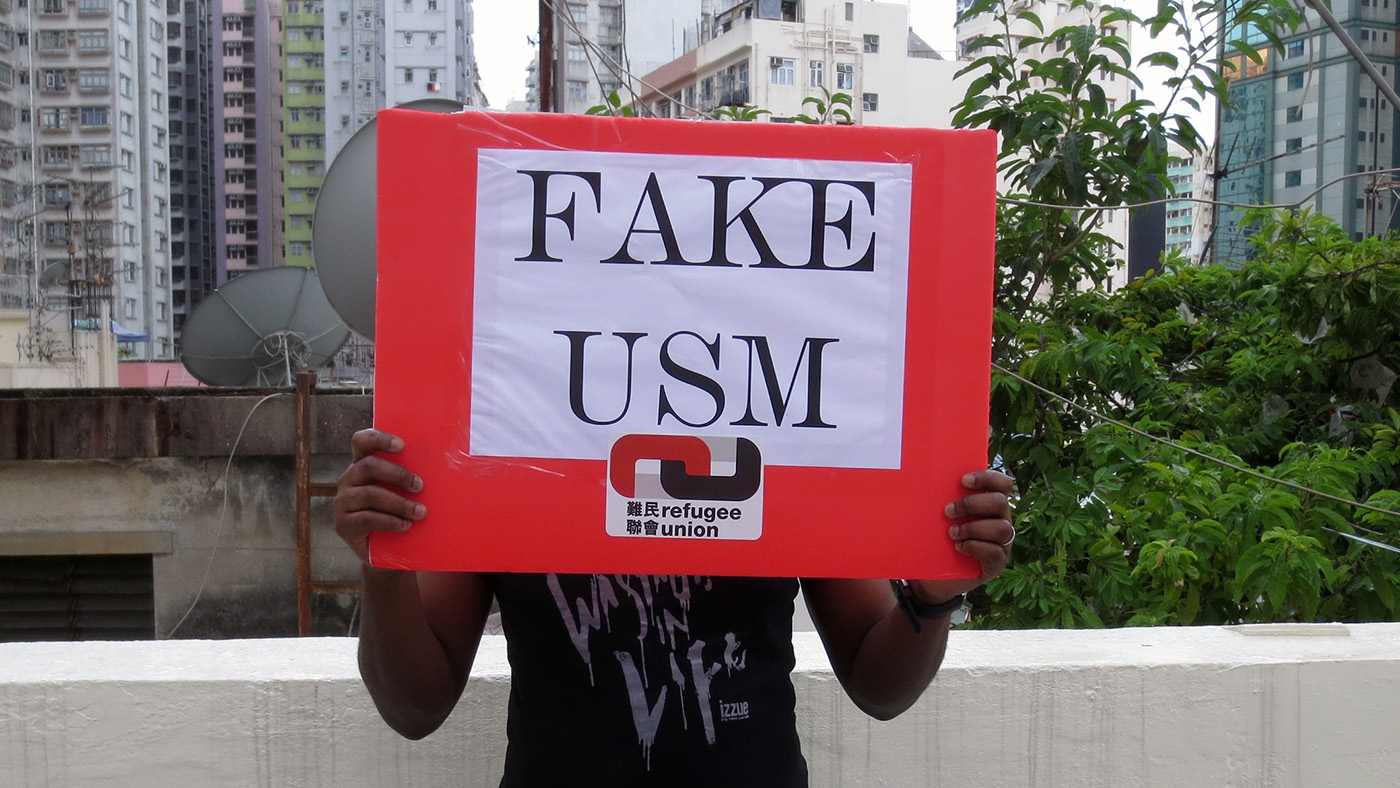
Are asylum seekers illegal, or is it politically expedient to brand us so?
Aug 20th, 2015 | Advocacy, Immigration, Personal Experiences, Rejection | Comment
For decades Hong Kong Government’s particularly the Security Bureau and the Immigration Department classified asylum seekers as ‘illegal immigrants’. Before I proceed further into the failed asylum system, let’s first go back to asking ourselves a question. Are asylum seekers really illegal immigrants? Let’s consider the following.
Under international law, it is not illegal to seek asylum. Article 14(1) of the Universal Declaration of Human Rights provides that ‘everyone has the right to seek and to enjoy in other countries asylum from persecution’. Here I should disclose that I availed myself of this life-saving right 10 years ago when I fled to Hong Kong. By the way, I am a refugee and I have been waiting for a decision on my claim since 2006, which is disappointing to say the least.
For years the Hong Kong Immigration Department has classified and prosecuting asylum seekers who entered illegally, or overstayed visas. This includes vilifying as criminal asylum seekers who sometimes have no choice but to use fake documents to flee to safety. It is a pity for Hong Kong – dubiously dubbed Asia’s World City – to punish asylum seekers who entered with non-genuine documents.
I asked myself, are the people working at Immigration capable of their duties, or are they following orders without common sense? One doesn’t have to be a genius to know that, people running away from life-threatening situations are allowed to travel on any form of identity they can grab in the urgency of flight. Are asylum seekers illegal, or is it politically expedient to brand us so?
Broadly speaking ‘Illegal Immigrants’ are hardship travelers who enter a country without meeting legal requirements, for example, without a valid visa or justification. But the similarity with asylum seekers ends here, because the former plan to return to their homeland in the future, while the latter went into exile to avoid physical harm and possibly death. Not the same, right?
As long as Hong Kong supports the “UN Convention Against Torture”, the Government is bound by duties not to return to risk states persons who claim to face torture or cruel, inhuman or degrading treatment or punishment. Therefore, I urge the Hong Kong Government to thoroughly look into the decision makers whom instruct immigration officers to break international laws to favor the interest and agenda of the leading class.
We are asylum seekers, not fool. We are not illiterate whereby the government and Immigration can insult or play with our intelligence. It is ridiculous how press releases and certain media reports vilify refugees as a collective of illegal immigrants! They should have done their homework better, before choosing such offensive and unjustified words.
It is time for the media to stop falling for propaganda. It could be argued that reporters who call refugees ‘illegal immigrants’ are in breach of journalistic ethics for failing in research and due diligence. I wonder if the companies they work for could be sued.
My message to the Hong Kong Government and Immigration is that, you need to wake up and grasp the concept that: There is no such thing as a bogus or illegal asylum seeker. Anyone in the world is entitled to seek protection in another country and have his or her claim assessed. The fairness and credibility of the process is of course entirely a different matter.
As a final note, asylum seekers cannot be maligned or prosecuted for entering a country without authorization, or the right paperwork in the moment of escape from danger. That would be akin to expecting that people to put on their Sunday clothes before escaping from a building on fire!
(Written by a refugee in Hong Kong since 2006)
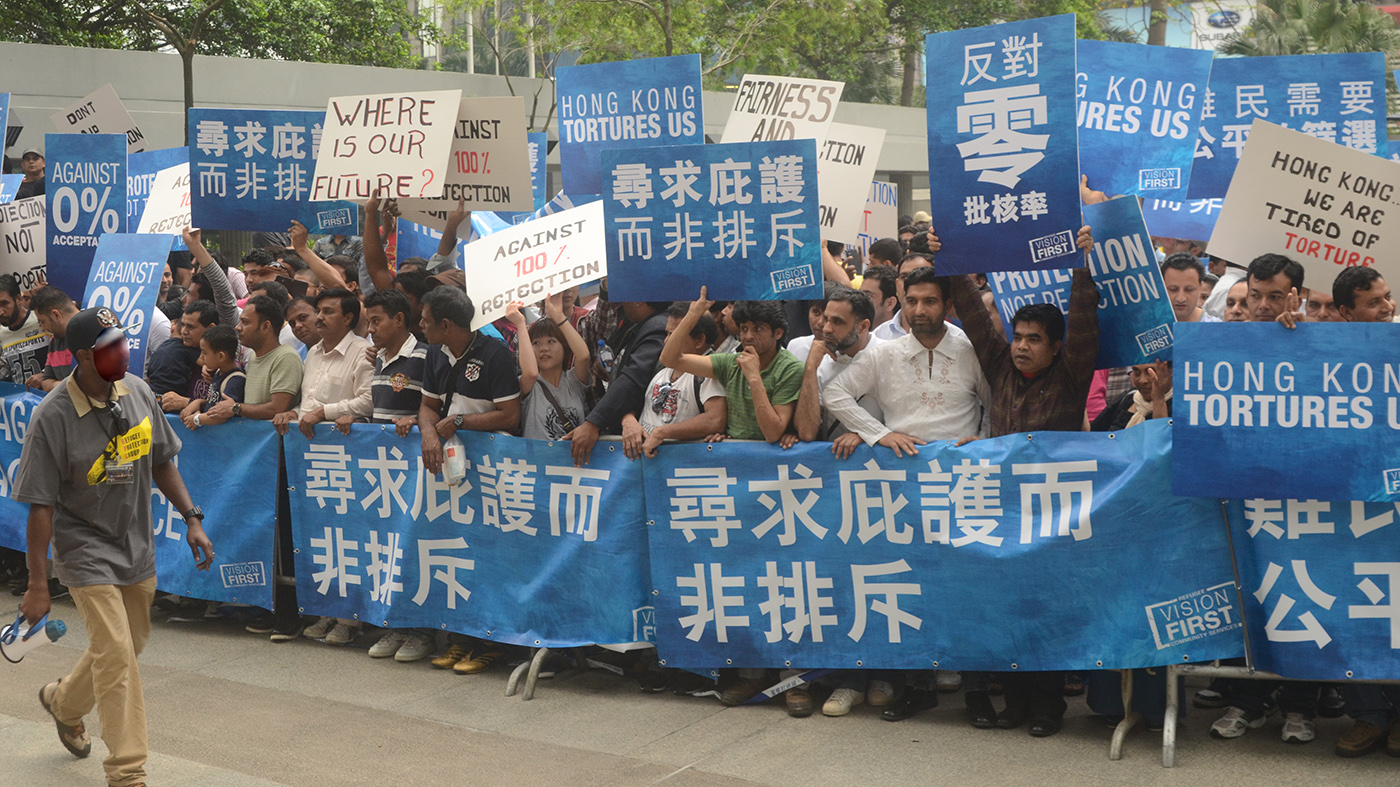
Immigration doesn’t want me to have a normal life
Aug 11th, 2015 | Immigration, Personal Experiences, Rejection | Comment
“I didn’t plan to come to Hong Kong,” recalls an African refugee. “An agent brought me here in 2004 on a passport I never saw. We were scheduled to take a flight to the States, when he said it would be delayed and we should stay overnight. At the McDonald’s near Star Ferry, I got into a misunderstanding with him and refused to do as he wanted me. He asked me to hold his leather jacket. He said he had to make a phone call … I never saw him again. Two days later I turned 15.”
Now Tommy (not his real name) is 26 years old, and is an exceptional refugee who continues to excel against overwhelming odds in a hostile asylum sphere that reduces to depression more experienced and wiser individuals. The young man credits his success in overcoming unending difficulties to a determination to turn every challenge around, “I learnt to depend on myself to solve my problems as this is my life!”
It is understandably hard for him to speak about his past. “My father passed away before I was born and my mother when I was 5. I was raised by my grandmother who died when I was 8. Then I was captured by the rebels. I was a child soldier for 5 horrible years. It was hell … I am still doing counseling and taking medications. When the agent abandoned me I was suicidal. God did not let it happen. I was helped by a US missionary who took me to the UNHCR. He saved my life.”
After a few days, Tommy was admitted to Queen Elizabeth Hospital where he spent ten trying days in the psychiatric unit. Upon discharge he was sent to a shelter where he experienced the failures of an underdeveloped welfare system for refugees in 2004. Eventually he was taken in by a church which still supports him. Tommy took education very seriously; he graduated from high school and went on to obtain a degree in business management.
“I couldn’t have done it without my wife, church and dad. He’s was my guardian, but I call him dad as I feel a father-son connection with him,” Tommy explains. “I met my wife at the church. She visited me in detention every week when I was arrested two weeks before turning 18. Immigration has given me a hard time ever since. I was ordered ‘Sign here. Don’t waste my time’ and nobody told me what documents they were. They refused to read back the statement before I signed them. Then my wife submitted my birth certificate and identity card. We got married in 2012, but my dependent visa was refused. Ironically my asylum claim remains undecided since 2004. Immigration doesn’t want me to have a normal life.”
Tommy obtained an African passport through the intervention of a maternal uncle who provided the statements necessary to confirm family ties prior to his abduction by the rebel group. The Beijing console interviewed him in Hong Kong, then a passport was issued without requiring travel to his homeland. “Immigration was not happy that I applied for a passport” Tommy said.
“This doesn’t make sense,” Tommy laments. “It is total injustice. I don’t know what applicants Immigration wants for dependent visas. I am not going to steal a local job, if that is what they are afraid of. I want to continue my studies overseas. I have two MBA offers, one from the UK and the other from Australia, and an MPA (Master in Public Administration) from the States. The church friends offered to pay for tuition, but I need a visa to prove that I am resident in Hong Kong.”
Frustration is palpable. “Immigration is trying to find faults in my application. First they tried to find faults in my wife’s documents, but they couldn’t. Now they say that I entered illegally as I came with an agent with a different passport. I had no idea what was submitted. I was a child. When the US consulate called Immigration, they were told, ‘This person does not exist in our system’. The consular staff then asked if my marriage certificate was fake as it was issued by Immigration. The line went dead when he asked for the officer’s name.”
More than three years after his marriage, the Legal Aid Department accepted Tommy’s application to judicially review Immigration’s refusal of his dependent visa. His lawyer is confident that the bureaucracy of rejection will crumble when the writ is filed at the High Court, because the legal grounds to condemn Tommy to a lifetime of welfare and marginalization may be challenged. It is regrettable that compassion is rarely shown to refugees who try their level best to integrate into society.
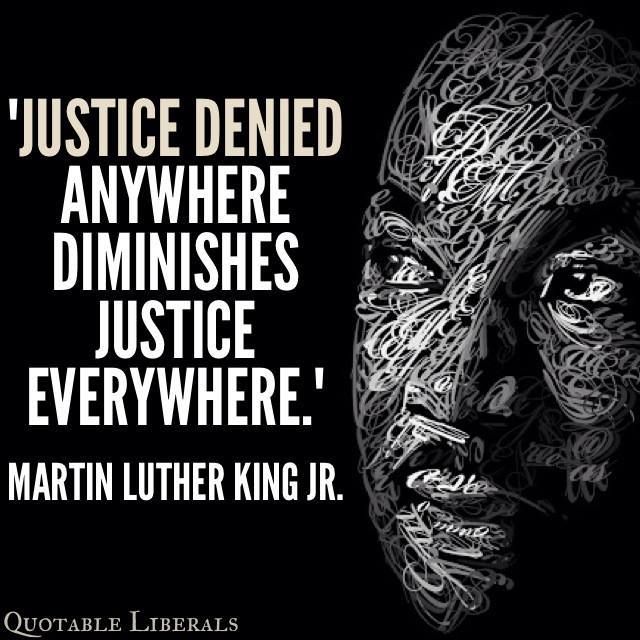
Immigration wastes 70,000 years in refugee lives
Aug 4th, 2015 | Immigration, Personal Experiences, Welfare | Comment
Hello, call me Outsider because I sought asylum in Hong Kong three years ago.
Recently there have been some sinister changes in the description of asylum seekers by the Government. One of the most sophisticated is turning the table on refugees by branding everyone an “illegal immigrant”. This wrong-minded propaganda does nothing to resolve the underlying issues. How many meetings were held? How much time and money were spent to come up with this brilliant idea?
Let’s look up the definition of “immigrant” (not illegal because refugees in HK have Immigration papers): a person who comes to live permanently in a foreign country. This definition has nothing to do with refugees. To label a group of people the first step should be getting to know them and understand their identity, narrative and objectives. One should understand who they are, not how we perceive them (prejudice), or how society treats them (discrimination). I suspect that Government is labeling refugees with the malicious aim of fueling public resentment and hostility.
Take my experience as an example. When I fled my country, where I was an established professional by the way, I was not dreaming of living in another country, particularly not Hong Kong. I cannot speak Chinese and I don’t practice kung fu, which is what this city was famous for where I grew up. Put simply, my objective was to save my life. I was arrested when leaving Hong Kong, not entering the city. I had no intention of staying, but have been stuck for three years already against my will.
Labelling refugees is aimed at residents, as it hardly affects who refugees are and how we evaluate the hostility we experience. I prefer to call myself a “runner for life” as I ran to save my life. No doubt you would have done the same! You can also call me an “outsider” as Hong Kong isolate me and makes me feel unwelcome. The Government does considers my needs, nor permits me to work to make a living.
Refugees most of all hate labels that are lies. I for one suspect that the Government is attempting to cast a negative name on refugees to stoke recrimination and hatred against our community, because they know that in truth it is the government policies that are to blame for the asylum mess in Hong Kong.
Some simple economic considerations might help to illustrate this problem:
There are about 10,000 refugees in Hong Kong who waste an average of 7 years to receive a (negative) decision on their asylum claim. Each refugee cost at least $3000 a month for rent and food, not including the cost of administration, lawyers, social workers, policing and detention. The total welfare amount alone is $2,500,000,000. Considering an average monthly salary of $7500, it would pay for 28,000 years of salaries!
I am outraged at the years and lives destroyed by the asylum process. How many years, and the most productive ones for that matter, does Immigration steal from refugees in the prime of their life? It is more than stealing because something stolen can be returned. Immigration is murdering 7 precious years that we can never get back. It is a priceless loss for persons in their twenties and forties who will never get their productive years back! Rejected after seven years of stress and pressure, nobody is the same person … people are lost, mentally broken, some even go crazy!
With the asylum process taking an average of 7 years, the above 10,000 refugees are expected to waste 70,000 years in Hong Kong, or the equivalent of about 1000 lifetimes. This is a tragedy and it doesn’t make sense to me. The result is that the current asylum process puts to waste 70,000 productive years (not young or old) and 2.5 billion dollars without accountability or consequence.
It is clear what Hong Kong Government has accomplished with 70,000 man-years and 2.5 billion dollars – nothing! What could the authorities do differently? WHAT WOULD YOU DO? How would you leverage these resources while finding a fair solution to the refugee dilemma? As Hong Kong takes great pride in its economic achievements, is it really impossible to productively deploy such manpower and capital?
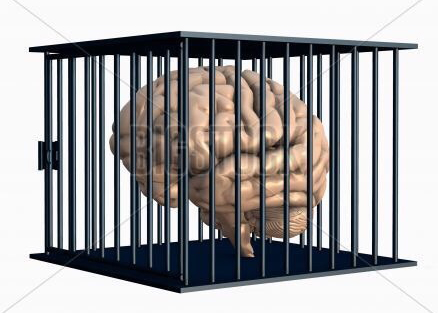
Inside prison I work for the government
Jul 22nd, 2015 | Crime, Housing, Immigration, Personal Experiences, Welfare | Comment
I am scarred because I don’t want to go back to prison. I was sentenced to 15 months for working to support my family, but I didn’t do anything criminal. In my mind, it was political persecution because refugees don’t have a straight road to walk. We go the wrong way because we don’t get enough assistance. We work to pay rent and buy food, but the police arrest us for “unlawful employment”.
I am a South Asian refugee mother with two daughters. Honestly I tell you, it is impossible for us to live with 3000$ rent and food coupons. Refugees need cash for many things, like going to the market and buying Pampers, clothes and school supplies. That is why we must do part-time job for our families in the day to day struggle. Also, my mother back home is sick, but I have no money to help.
In 2012, I was arrested at a fish restaurant in Tuen Mun. The police catch me and my offence is taking unlawful employment. Now I wish to unburden myself and tell the truth that the judge did not consider. The ISS assistance did not pay my full rent and utilities. I have no husband so I have to worry about my girls and everything I have to buy for them. That is why I have to do work before and now.
I tell my problems to my case officer but she cannot help. “This is the rules”, she always tells me so I know that I have to find a way by myself. If the landlord kick us outside, what will happen to my girls? My friend introduced me to a boss who paid me 400$ to wash dishes all day. There is other work for women, but it is not acceptable for me because it is very dangerous and I have children.
Why inside prison have so many refugees working? Many resident prisoners refuse to work, or have mental problems, or do drugs before. Refugees are strong and hard-working. Inside prison we work for the Government of Hong Kong, for example, washing and ironing uniforms and hospital sheets. They pay us 5$ a day and get cheap labour from thousands of men and women refugees who cannot work outside. Why does it happen like this?
Before I am outside and I work for my family. When police catch me they send me to prison. Then I am inside prison and I work for the government. But still I am working: outside it was illegal because I cannot help the government, but inside it is legal because I can help the government. Would it be fairer for Immigration to let refugees work outside to buy what we need and not do crime?
Inside prison I cannot refuse to work because the officers shout at me. I must do the jobs that they give me all the morning and afternoon, also on Sunday. So please tell me if this is fair to refugees? Outside I cannot do work, but must survive without enough assistance. Inside I must do work like a slave for the Government for 15 months without a holiday and without choice. Is this right?
I don’t want to go back to prison. The police tell me that if catch again, next time they will fine me 50,000$ and put three years in prison. Now I don’t know how I can buy something that my daughters need. Every day and night I am going mentally sick and depression. Refugees are always scared of going to prison, even if their children are born on Hong Kong land and never see their parents’ country.
Also refugees have dreams for their future. I want a safe and healthy life for my children. I want them to be happy and not suffer like this. But what can I offer them? We cannot go back to my country and Hong Kong does not let us stay. I dream of a better future when I can do something good for children, because today they suffer too much.
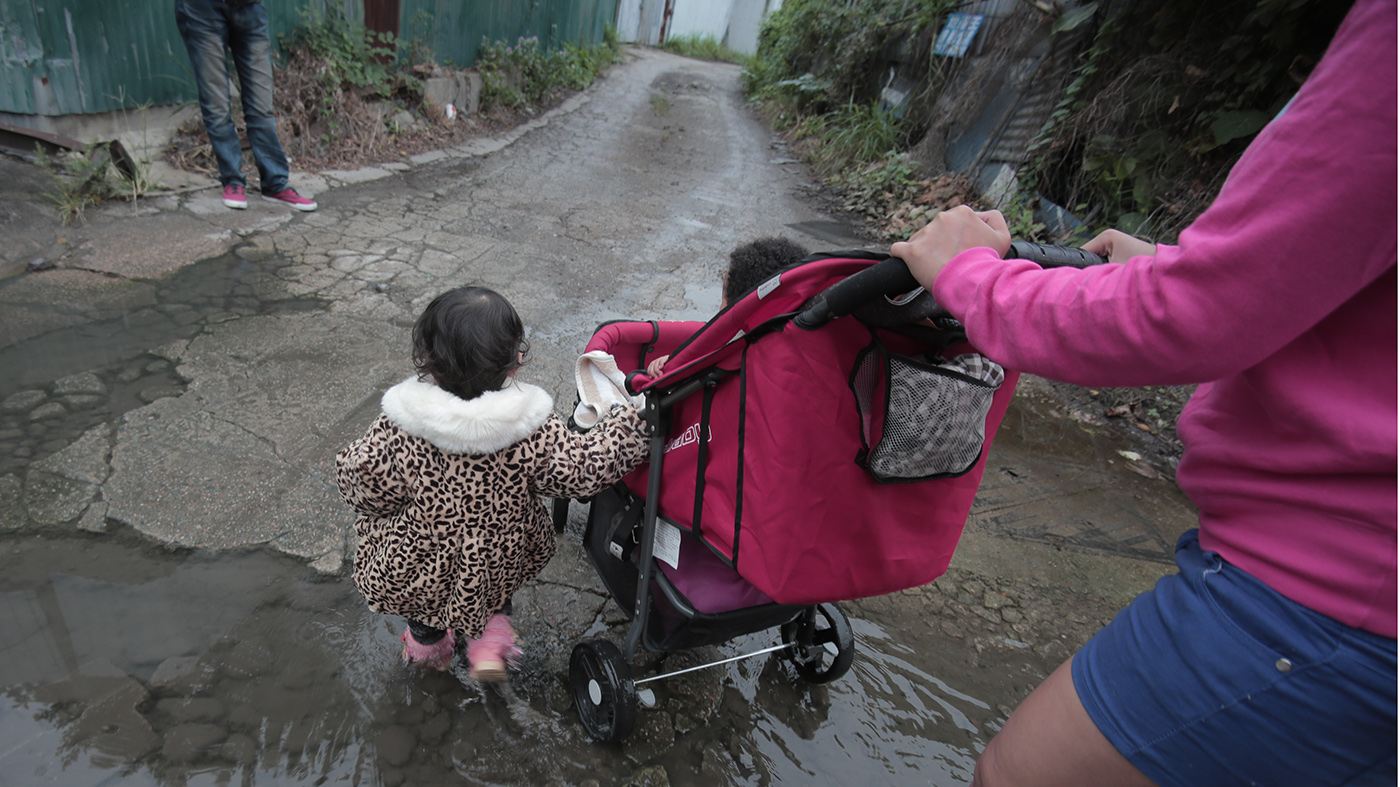
Ahmadiyya community seeks empowerment by Vision First
Jul 17th, 2015 | Advocacy, Immigration, Personal Experiences, Rejection | Comment
Rashid, 45, fits immigration profiling that perpetuates the department and city-wide culture of rejection: he is Pakistani and was convicted in 2001 for possessing a fake ID card; he was deported, but returned illegally in 2007 by speedboat; he overstayed 7 years before VF arranged his surrender to Immigration; he admits to working illegally to make ends meet and send money to family members who depend on him.
The question is: Is Rashid abusing the asylum process?
“If we can see the moon tonight then Ramadan is finished, otherwise we shall wait one more day,” explained Rashid as he welcomed us into a peaceful village compound for the Eid festivity that marks Ramadan’s end. Rashid belongs to the Pakistani Ahmadiyya minority. The community president explained the religious persecution, “Ahmadis were formed in 1889 in India from a Sunni branch. In 1903 the center was moved to Punjab and we are now based in 206 countries, with our Chief Imam in exile in London. In 1974 the Pakistani government amended the constitution and declared Ahmadis non-Muslim sparking discrimination, persecution and murders, often instigated by firebrand mullahs who preach that killing Ahmadi is a pious act rewarded by virgins in Heaven!”
When the family fled persecution and violence, Rashid came to Hong Kong, while his wife and children fled to Thailand. They were eventually recognized as refugees by the UNHCR in Bangkok and resettled to the Unites States. The heartbroken father explains that other relatives also gained refugee status in the UK and Canada. He explains that “Before there were 250 Ahmadiyya refugees in Hong Kong, including children. Now we are only 70 as many moved to other countries with the help of UNHCR, or through private sponsorship. There is no future for our people in Hong Kong.” The Unified Screening Mechanism (USM) seems to have worsened their prospects.
“We need to empower our community,” Rashid requested, “because the UNHCR is closed and Hong Kong Government does not understand or accept us. Our community is persecuted to death and Immigration tells us to move to live in other cities in Pakistan. How is that possible? Our passports and ID cards state we are “Ahmadi” and there is no safety anywhere after you name is on the kill list. Those who murder us are celebrated … even by the police!”
An agitated elderly member interrupted, “Immigration rejected my claim! They said that false police charges are a personal problem and I should have complained to other department, as written on some website. What good is that? My neighbours attacked us to steal our family business because I am Ahmadi. No other reason! The police took no action to stop them and then made false charges to arrest me. Since the (anti-Ahmadiyya) Ordinance thousands have been murdered. I had to escape to save my life. That is the truth!”
After sharing a prayerful moment, the community leaders asked about Vision First’s activism and empowerment they had heard about from a handful of active members. The president encouraged the development, “The Ahmadis are known for being peaceful. We don’t believe in strikes. Instead we pray that Allah will change our enemies’ hearts. But today we understand we need organization because Immigration does not understand our problems. We wish to provide our documents and evidence to explain the religious persecution we suffer in Pakistan. We live in exile here.”
The president recently learned a lesson about dealing with Immigration. He reported, “We applied for a visa for an Imam as the community needs religious teaching. But Immigration refused three times. After we contacted a lawyer and he threatened to go to court, Immigration wrote back that it was not necessary and the application would be accepted in seven days. Three days later the visa was issued! So we understand that without pressure it is hard to win in Hong Kong.”
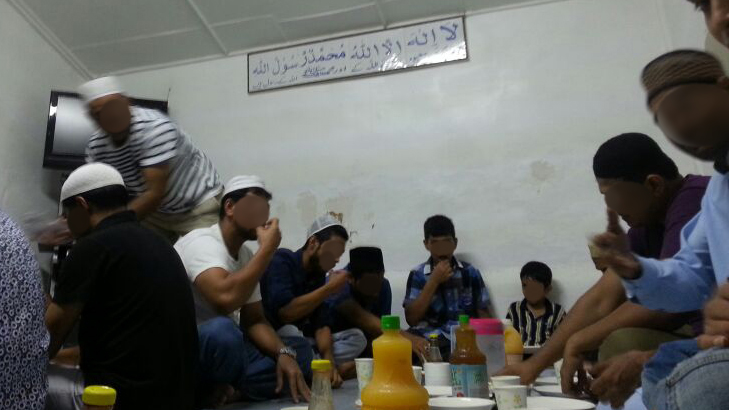
The current refugee system fails Hong Kongers, the gov’t and refugees
Jul 17th, 2015 | Media, Personal Experiences, Rejection | Comment
Enrollment deadlines force refugee parents to struggle
Jul 16th, 2015 | Personal Experiences, Schooling, VF Opinion | Comment
Financial stress surges in July for refugee parents forced to meet school enrollment deadlines for their children. An African mother explains her predicament, “Hong Kong says it provides an education for refugee children, but it’s misleading. If they said, ‘Here is the school, here are the books and uniform, go to school’, then it would be true. But we must find thousands of dollars or our children stay home.”
This mother was recognized as a refugee in Hong Kong, which makes no difference in the clash with the bureaucratic mindset of Hong Kong Government. Last year, Abby (not her real name) only had two of three children in school because she was unable to raise enough money. “I home-schooled my youngest daughter because the donor offered only enough for two”.
According to a recent report by the South China Morning Post, among 9,940 individuals seeking asylum in Hong Kong, 504 are minors and 269 were born in Hong Kong. While an unknown number is below kindergarten age, the majority must attend nine years of compulsory schooling, six in primary school and three in junior secondary school. Most also attend 3 years of kindergarten which is essential to learn Cantonese for the higher grades.
With pressure to raise money in a hurry, Abby approached the UNHCR for a US$ 1,000 advance to pay for school books, uniform, shoes and enrolment fees required by the primary school. Despite a worldwide annual budget of US$ 5.3 billion, the United Nations refugee agency turned the desperate mother away empty handed. No effort was made to introduce her to a private donor either.
“Only mothers know how much they suffer for their children,” Abby remarked, “I have to give them education, but I cannot work and I have no money. I went to several charities and they said they cannot help. What am I supposed to do?”
Between July and December, refugee parents desperately need to raise money to pay for school costs (including tuition fees for kindergartens) that will be refunded in December or January by the Student Financial Assistance Agency (SFAA). The parents are not begging for donations, but for bridging loans essentially guaranteed by the SFAA, as refunds may be made to donors’ accounts. The reason for this delay is questionable. It is a huge challenge to find donors. The process again raises doubts about policies that influence refugees’ mental health and enforce precarious livelihoods.
It is indeed unreasonable that the parents of refugee children are subjected to the annual (demeaning) routine of begging for cash to comply with the Education Bureau’s payment policies. Vision First urges the government to have SFAA liaise directly with the school to either release the funds upon enrollment in July, or issue wavers for approved refugee students. Similar arrangements are made by the Hospital Authority that does not require refugee to prepay medical costs.
Residents might find it acceptable to collect SFAA grants 4 to 5 months after school starts, but it is unfair for refugee parents who are prohibited from working, receive insufficient welfare assistance and cannot avail themselves of support from wider family, social and charitable networks.
If education is the right of every child, irrespective of immigration status, then Hong Kong Government should refrain from turning it into another deterrent mechanism that “drives refugees crazy”, as Abby put it.
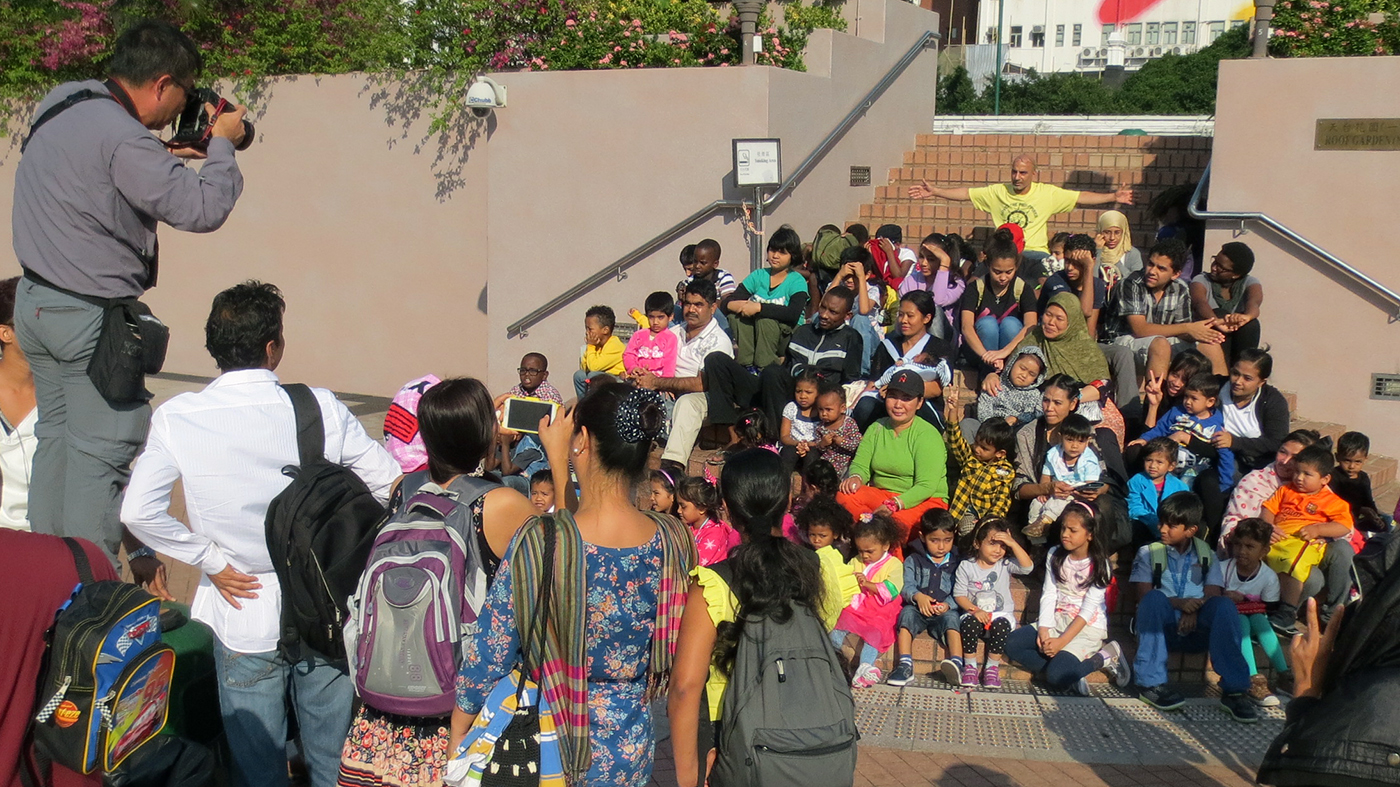
HK parents of refugee children face hurdles to get them an education
Jul 12th, 2015 | Advocacy, Personal Experiences, Rejection, Schooling | Comment
Lack of Hong Kong ID card means isolation and education limbo
Jul 12th, 2015 | Immigration, Media, Personal Experiences, Rejection | Comment


